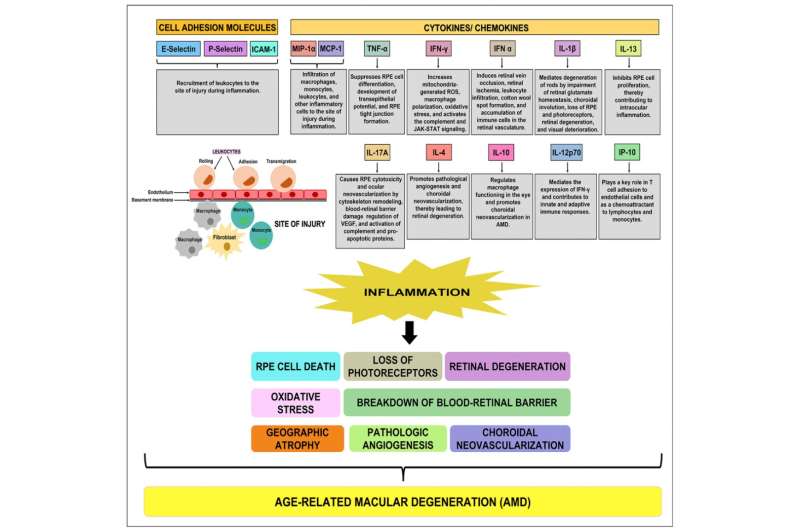Schematic showing the function(s) of cell adhesion molecules, cytokines, and chemokines. Credit: Aging-US.com
A new research paper has been published in Aging (Aging-US), titled "Effect of Humanin G (HNG) on inflammation in age-related macular degeneration (AMD)."
Inflammatory processes drive the progression of age-related macular degeneration (AMD) disease—a leading cause of vision loss in the United States.
In this new Aging study, researchers from the University of California Irvine and University of Southern California compared the protein levels of inflammation markers in normal and AMD retinal pigment epithelial (RPE) transmitochondrial cybrid cells and investigated the effects of treatment with exogenous Humanin G.
Humanin G (HNG) is a mitochondrial derived peptide that is cytoprotective in AMD and can protect against mitochondrial and cellular stress induced by damaged AMD mitochondria.
"The goal of this study was to test our hypothesis that inflammation-associated marker protein levels are increased in AMD and treatment with HNG leads to reduction in their protein levels."
Humanin G protein levels were measured in the plasma of AMD patients and normal subjects using ELISA assay. Humanin G was added to AMD and normal (control) cybrids derived from clinically characterized AMD patients and normal (control) subjects. Cell lysates were extracted from untreated and HNG-treated AMD and normal cybrids, and the Luminex XMAP multiplex assay was used to measure the levels of inflammatory proteins.
The researchers found that there were differential levels of inflammation proteins between normal and AMD plasma samples. Compared to control plasma samples, AMD plasma showed higher protein levels of inflammation markers. However, plasma levels of endogenous Humanin protein were 36.58% lower in AMD patients compared to those in age-matched normal subjects. After treatment with Humanin G, the researchers observed a marked reduction in protein levels of inflammation markers that were elevated in AMD RPE transmitochondrial cybrid cells.
"In conclusion, we present novel findings that: a) show reduced Humanin protein levels in AMD plasma vs. normal plasma; b) suggest the role of inflammatory markers in AMD pathogenesis, and c) highlight the positive effects of Humanin G in reducing inflammation in AMD."
To the teams' knowledge, this is the first study to report notably reduced Humanin protein levels in AMD patients, thereby corroborating the pivotal role of Humanin in maintaining tissue homeostasis and normal functioning in the eye.
"Our discovery is novel and may contribute to the development of therapeutics tools for reducing inflammation to alleviate AMD disease pathology," the researchers conclude.
More information: Sonali Nashine et al, Effect of Humanin G (HNG) on inflammation in age-related macular degeneration (AMD), Aging (2022). DOI: 10.18632/aging.204074
Provided by Impact Journals
























